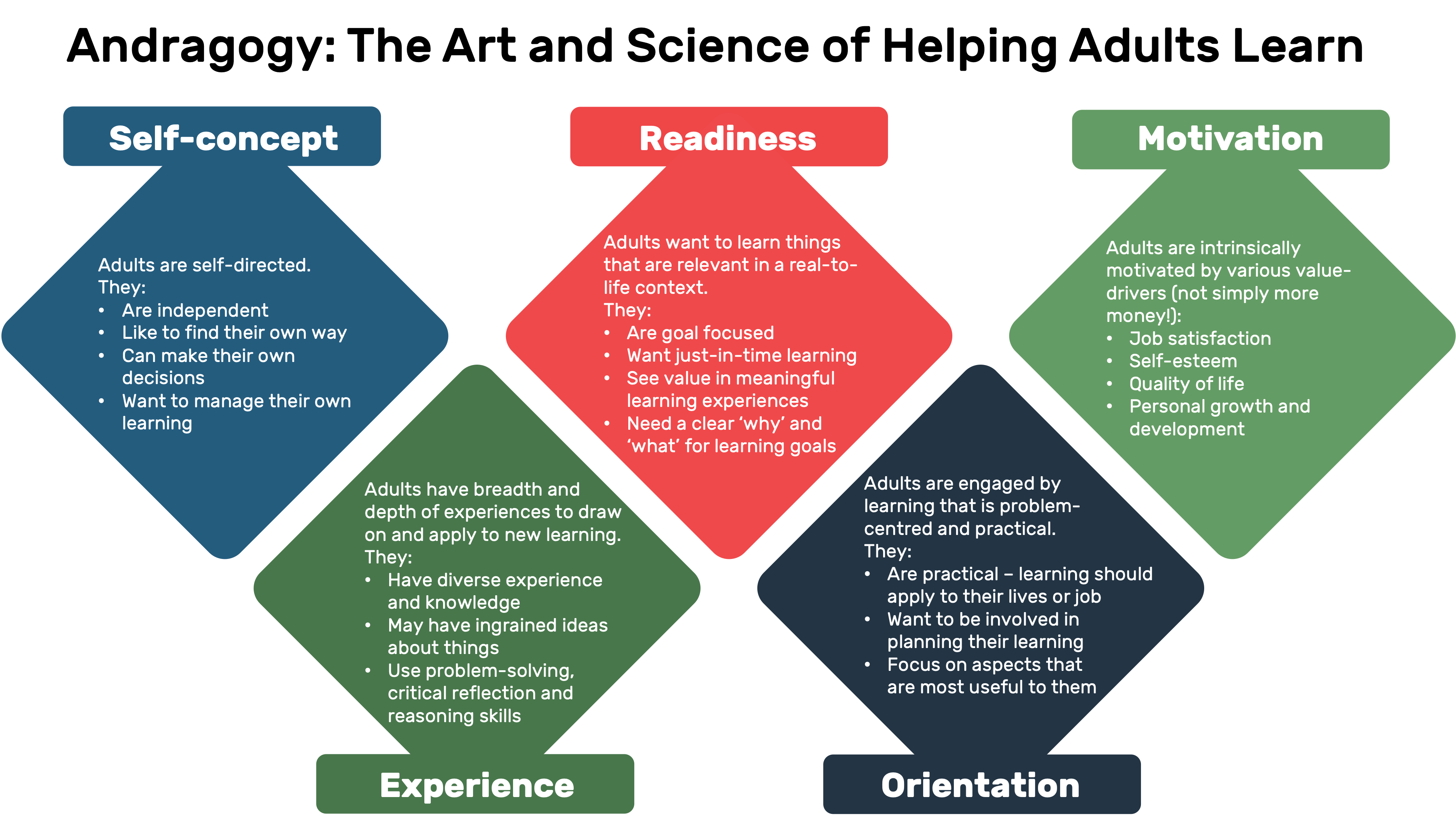Andragogy: Adult Learning Theory
What is Andragogy Adult Learning Theory?
Malcolm Knowles (1913-1997) was an influential American educator who popularised the term ‘andragogy’, the art and science of how adults learn. It describes the key characteristics of adult learners (as distinct from children ‘pedagogy’). It has become a highly influential adult learning theory and continues to shape learning design today.
Knowles developed the first four assumptions about how adults learn in 1980 and added the fifth in 1984.
Andragogy: The five assumptions
1. Self-concept
Adults are self-directed. They:
- Are independent
- Like to find their own way
- Can make their own decisions
- Want to manage their own learning
2. Experience
Adults have breadth and depth of experiences to draw on and apply to new learning. They:
- Have diverse experience and knowledge
- May have ingrained ideas about things
- Use problem-solving, critical reflection and reasoning skills
3. Readiness
Adults want to learn things that are relevant in a real-to-life context. They:
- Are goal focused
- Want just-in-time learning
- See value in meaningful learning experiences
- Need a clear ‘why’ and ‘what’ for learning goals
4. Orientation
Adults are engaged by learning that is problem-centred and practical. They:
- Are practical – learning should apply to their lives or job
- Want to be involved in planning their learning
- Focus on aspects that are most useful to them
5. Motivation
Adults are intrinsically motivated by various value-drivers (not simply more money!):
- Job satisfaction
- Self-esteem
- Quality of life
- Personal growth and development
These assumptions recognise that there are differences in the ways adults learn from children. Andragogy focuses on the process of learning, rather than the product. It supports discovery-based learning, encouraging learners to construct their own understanding through problem-solving and collaboration with peers.
Respecting the principles of adult learning will help to engage and motivate participants. Keep Knowles’ 5 principles of adult learning top of mind when designing your programs.
Andragogy: Adult Learning Theory
Related blog articles:
- The Many (Many, Many!) Instructional Design Models
- Learning Methodologies and Activities
- The 70:20:10 Learning Model
- The Science Behind Attention Spans
- Merrill’s Instructional Design Principles
- Embedding Activities in Learning Design: Why Leaders Matter
- How to Apply Merrill’s Instructional Design Principles
FAQs
What is andragogy adult learning theory?
Andragogy, the art and science of how adults learn, describes the key characteristics of adult learners (as distinct from children ‘pedagogy’).
Is andragogy the same as adult learning theory?
‘Andragogy’ refers to the art and science of how adults learn. It has become a highly influential adult learning theory and continues to shape learning design today.
What is adult learning theory Knowles?
Malcolm Knowles (1913-1977) was an influential American educator who popularised the term ‘andragogy’, the art and science of how adults learn.
What are the five principles of andragogy?
The five principles of andragogy are:
- Self-concept
- Experience
- Readiness
- Orientation
- Motivation
Why is andragogy important in teaching adults?
Andragogy recognises that there are differences in the ways adults learn from children. This distinction is vital to help to engage and motivate adult learners.
What are the benefits of andragogy?
Respecting the principles of adult learning will help to engage and motivate participants. It supports discovery-based learning, encouraging learners to construct their own understanding through problem-solving and collaboration with peers.
What are the four principles of andragogy?
Knowles developed the first four assumptions about how adults learn in 1980 and added the fifth in 1984.
The five principles of andragogy are:
- Self-concept: Adults are self-directed.
- Experience: Adults have breadth and depth of experiences to draw on and apply to new learning.
- Readiness: Adults want to learn things that are relevant in a real-to-life context.
- Orientation: Adults are engaged by learning that is problem-centred and practical.
- Motivation: Adults are intrinsically motivated by various value-drivers (not simply more money!).
References:
- Knowles, M. (1984). The Adult Learner: A Neglected Species (3rd Ed.). Houston, TX: Gulf Publishing.
- Knowles, M. (1984). Andragogy in Action. San Francisco: Jossey-Bass.



